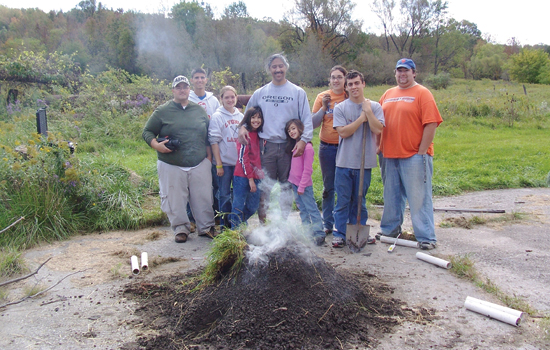Research program aims to increase number of Native-American graduates
A research team led by RIT professor Paul Shipman, far left, is conducting experiments at Gonandagan National Historic site on the use of biochar, a carbon-based nutrient created through use of burning pits, as shown, to improve agriculture production.
Through a unique education, research and cultural initiative, RIT is seeking to advance educational experiences and increase college graduation rates among Native American students. The program also works to enhance research and cultural programs designed to promote native science and a better understanding of Native American history and society.
The Future Stewards Initiative provides on-campus support, student advising and research and cooperative education opportunities for American Indian, Alaska Native and First Nations scholars. It also works with multiple reservations and Indian assistance organizations to promote higher education opportunities in Native American communities. The program, in its third year, currently serves close to 70 RIT students who represent 26 tribes from across the country. Future Stewards scholars have a cumulative GPA of 3.06.
“Native Americans are the fastest growing affinity group, but are the least likely to attend college,” says Jason Younker, director of the initiative and a member of the Coquille Indian Tribe. “Through this program we hope to increase the number of kids applying to college and better assist Native American students in succeeding when they come to RIT.”
The initiative supports multiple campus student organizations, including the American Indian Science and Engineering Society and the Native American Student Association, which offer social activities and additional academic support. It also helped develop a Native American science and technology concentration within the Department of Material and Cultural Studies and sponsors an environmental science field research station at the Ganondagan State Historic site in Victor.
“The development of educational and research opportunities in native science and technology can assist Indian students in learning more about their culture and history, while also promoting the use of native techniques in improving modern agriculture and environmental science,” adds Paul Shipman, associate professor of biological sciences and associate director of the Future Stewards Initiative.
Younker and Shipman hope to expand recruitment efforts to increase the number of Native Americans attending RIT, while also assisting additional universities in developing similar programs. President Bill Destler has also created a Native American Advisory Council that will assist the administration in growing the Future Stewards Initiative and develop additional services for Native American students.
“RIT is committed to expanding opportunities for Native Americans, and hopes to assist in the creation of better national education initiatives targeted at Native American communities,” notes Younker, who also serves as assistant to the RIT provost for Native American affairs.














